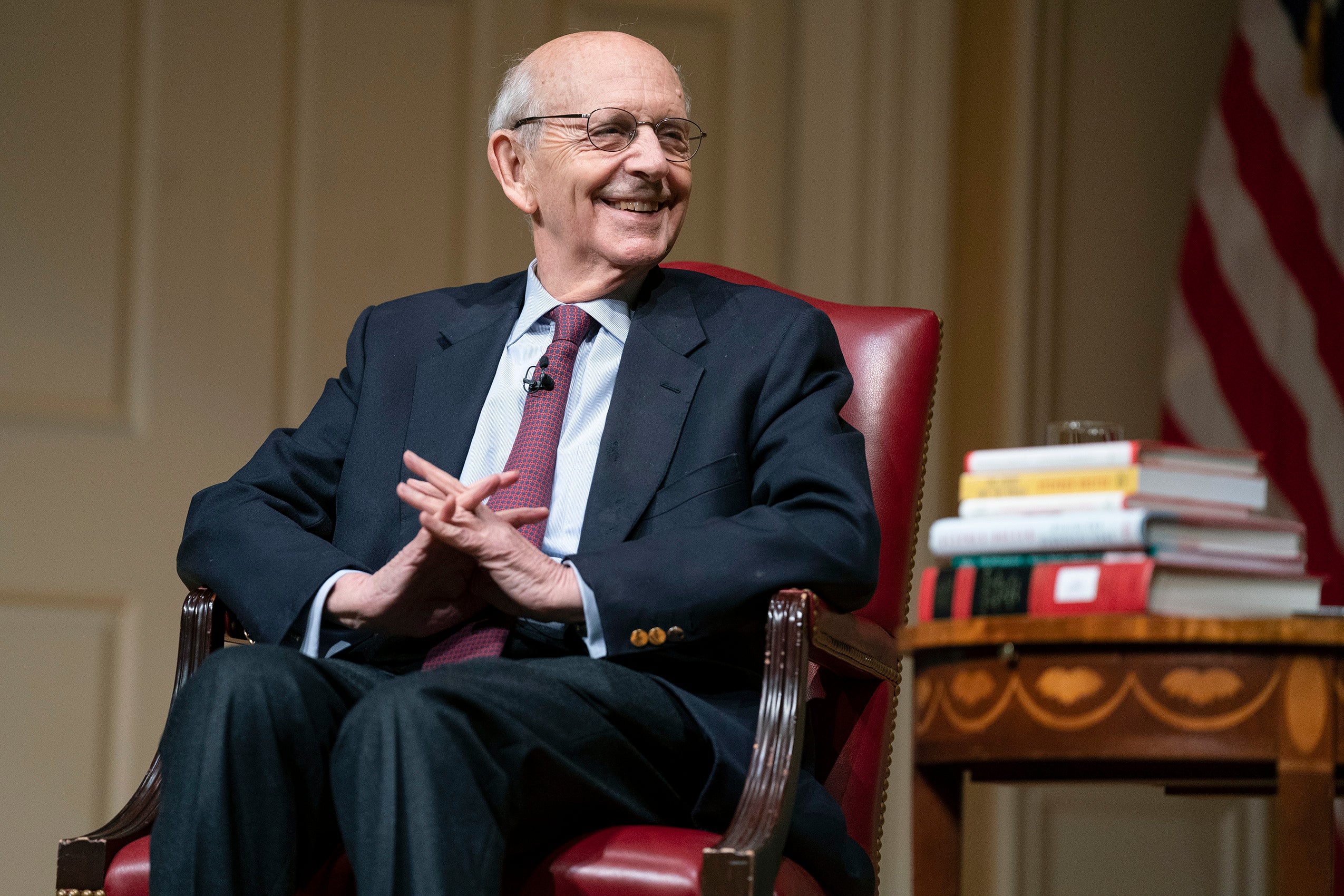Justice Stephen Breyer ’64 has been named the Byrne Professor of Administrative Law and Process at Harvard Law School, effective immediately. He joins a group of faculty who have become HLS faculty members after illustrious legal careers in the profession and bring deep expertise and excellence to the shared work of this community.
The appointment also marks a homecoming for Justice Breyer, who both attended and taught at Harvard Law School. The Byrne chair, which he will now hold alongside Professor Todd Rakoff ’75, was previously held by Justice Felix Frankfurter LL.B. 1906 from 1924 until his appointment to the Supreme Court in 1939.
“Justice Breyer is a historic jurist and a world-class legal scholar who also has a distinguished history as a member of this faculty,” said John F. Manning ’85, the Morgan and Helen Chu Dean and Professor of Law. “I am thrilled to welcome him home to Harvard Law School. His brilliance, experience, collegiality, openness, and intellectual inquisitiveness will deeply enrich our community and advance our mission of teaching, scholarship, and service.”
Justice Breyer will teach seminars and reading groups, continue to write books and produce scholarship, and participate in the intellectual life of the school and in the broader Harvard community.
Justice Breyer said: “I am very pleased to return to Harvard to teach there and to write. Among other things, I will likely try to explain why I believe it important that the next generations of those associated with the law engage in work, and take approaches to law, that help the great American constitutional experiment work effectively for the American people.”
Faculty members from across Harvard Law School expressed deep enthusiasm about his joining the faculty.
“From his pioneering work on deregulation to his ongoing writings about judicial method, Justice Breyer has been one of the most influential contributors to American law and policy for decades,” said Martha Minow, the 300th Anniversary University Professor and former dean of Harvard Law School. “As an interlocutor, Justice Breyer is thoroughly engaging, candid, and unpretentious whether with colleagues or students,” Minow added. “He loves ideas and he loves debating them, which — with his expertise and experiences — makes him an especially fine candidate to serve as our colleague.”
Cass Sunstein ’78, the Robert Walmsley University Professor, praised Justice Breyer’s pathbreaking scholarship in administrative law. “Justice Breyer is in the highest ranks of the leading figures in administrative law,” Sunstein said. “More than anyone, Breyer has injected regulatory policy into administrative law, and demonstrated that the two must be studied in tandem.” Sunstein added that Breyer “is also a terrific colleague. He is a generous critic, full of constructive suggestions; he combines natural academic instincts with practical experience, which leads to some unique, and uniquely valuable, perspectives on other people’s projects.”
Andrew Crespo ’08, who clerked for Justice Breyer and is the Morris Wasserstein Public Interest Professor of Law, noted: “Clerking for him felt much like a year-long seminar — more an intimate academic conversation than a job. Having him share a version of that experience with some of our students will enrich them immeasurably. And, for all of us on the faculty, it will be wonderful to welcome him home.”
Breyer earned his A.B. magna cum laude in philosophy from Stanford University. As a Marshall Scholar, he received a B.A. from Magdalen College at Oxford University with first class honors. Breyer then graduated magna cum laude from Harvard Law School and was an articles editor on the Harvard Law Review. Following his graduation in 1964, he served as a law clerk to U.S. Supreme Court Justice Arthur Goldberg.
Breyer served on the Harvard Law School faculty from 1967 to 1980 and held a joint appointment at the Kennedy School of Government from 1977 to 1980. Breyer also held numerous public service positions, serving as special assistant to the assistant U.S. attorney general for antitrust (1965–1967), assistant special prosecutor of the Watergate Special Prosecution Force (1973), special counsel to the U.S. Senate Judiciary Committee (1974–1975), and chief counsel of that committee (1979–1980).
In 1980, President Carter appointed Breyer to the U.S. Court of Appeals for the First Circuit, on which he served from 1980 to 1994. He was chief judge from 1990 to 1994. During his time on the First Circuit, Breyer also served as a member of the U.S. Sentencing Commission from 1985 to 1989. In 1994, President Clinton nominated Judge Breyer as an associate justice of the Supreme Court, and he took his seat August 3, 1994.
Justice Breyer has written extensively on wide-ranging subjects including administrative and regulatory policy, comparative constitutional law, and statutory and constitutional interpretation. His books include: “The Authority of the Court and the Peril of Politics” (2021); “The Court and the World: American Law and the New Global Realities” (2015); “Making Our Democracy Work: A Judge’s View” (2010); “Active Liberty: Interpreting Our Democratic Constitution” (2005); “Breaking the Vicious Circle: Toward Effective Risk Regulation” (1994); “Regulation and Its Reform” (1984); and “Energy Regulation by the Federal Power Commission” (1974) (with Paul W. MacAvoy). He also has dozens of law review publications across a wide range of subject matter areas.
Breyer was born in 1938 in San Francisco, the son of Anne and Irving Breyer. His mother’s work focused on public service and his father was legal counsel for the San Francisco Board of Education for 40 years. Breyer was an Eagle Scout. He served in the U.S. Army Reserve for eight years, including six months on active duty during college.
